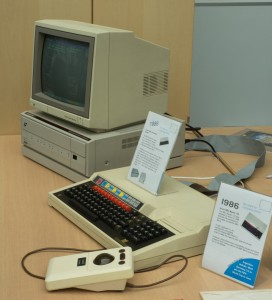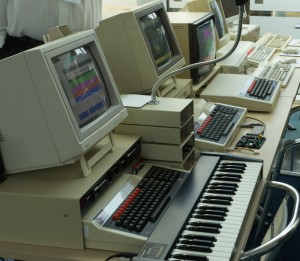Following on from the article mentioned yesterday, the World Service broadcast about the Trojan Room Coffee pot went out today.
Links to the programme, and a downloadable version here, if wanted.
Following on from the article mentioned yesterday, the World Service broadcast about the Trojan Room Coffee pot went out today.
Links to the programme, and a downloadable version here, if wanted.
 There was a great opportunity in Cambridge today for techies of a certain age to get all nostalgic about a machine which, for many of us, changed our lives, at the 30th anniversary party for the BBC Micro.
There was a great opportunity in Cambridge today for techies of a certain age to get all nostalgic about a machine which, for many of us, changed our lives, at the 30th anniversary party for the BBC Micro.
Organised by Jason Fitzpatrick’s soon-to-be-Cambridge-based Centre for Computing History, with the assistance of ARM, Redgate and several others, this brought together most of the original team, and many of the original machines and peripherals, that we remembered so well.
There was much discussion about the legacy of the project, and my friend Eben Upton gave an inspiring talk about the aims of the Raspberry Pi team, which many hope will be the BBC Micro for the next generation.
One thing that occurred to me during the presentations was that the original BBC Model B sold for £399, or approximately £1200 in today’s money. (That’s about the price of a MacBook Pro now.) The investment that my parents were making in my future was not the cost of a Raspberry Pi. It was the cost of about 40 Raspberry Pis – a whole classroom-full. Eben, significantly, pointed out in his talk that they hoped it wouldn’t really be schools or parents who would buy most of these. It would be the children themselves. And I think that’s important.
 Now, progress always depends on building new layers of technology on the platforms provided by the past. When I was young, the transition in play was from a world in which we bought electronic components to one in which we bought computers. Sinclair and Acorn made that transition accessible to kids. But computers are now a commodity, and you can argue that what’s really important for kids to learn is the different ways of connecting them together in the real world. So my hope is that initiatives like Raspberry Pi will allow kids not just to own a computer, but to own a network. To learn about how networks work, to invent new ways of making use of them. Yesterday’s solder track is today’s ethernet cable. Yesterday’s 6502 assembly language is today’s IPv6 routing table.
Now, progress always depends on building new layers of technology on the platforms provided by the past. When I was young, the transition in play was from a world in which we bought electronic components to one in which we bought computers. Sinclair and Acorn made that transition accessible to kids. But computers are now a commodity, and you can argue that what’s really important for kids to learn is the different ways of connecting them together in the real world. So my hope is that initiatives like Raspberry Pi will allow kids not just to own a computer, but to own a network. To learn about how networks work, to invent new ways of making use of them. Yesterday’s solder track is today’s ethernet cable. Yesterday’s 6502 assembly language is today’s IPv6 routing table.
And if we believe that there’s any mileage in the internet-of-things/automated-home ideas, then perhaps the equivalent investment that today’s parents might make could be, say, a ‘connected room’ kit, which allowed kids to give a URL to each lightbulb, each plug socket, each radiator valve, each loudspeaker, and the door. And then see how they link those together, and to their Facebook account, and to the Xbox, and so forth. Turn the music on when you turn on the light. Turn the heat down when you go to bed. Turn the lights down when you turn on the TV. It’s a Lego kit that lets you play with the living spaces of the future, and perhaps monitor your carbon footprint at the same time.
Maybe… I don’t know. There may be better ideas. This sounds fun to me, though! It could teach you a lot about networking.
And it could still cost much less than the original BBC Micro did.
An interesting start to the day today.
At an hour at which all civilised people should still be tucked up in bed, I presented myself at the dear old BBC Television Centre to be interviewed on the Breakfast TV programme. I was then whisked upstairs to do the same on Radio 5 Live before coming back downstairs again to do a slight variation on the theme on TV again.
And the reason for all this early-morning scurrying through the rather charming maze that is the BBC?
Well, it’s about 20 years since the start of the World Wide Web. (Do you remember when we used to call it by its full name to distinguish it from the more common arachnean use?) So they’ve been running various anniversary features and interviews, and the old webcam story is always a good light-hearted one when most of the rest of the day’s news is about economic collapse!
It’s hard to pin an exact date on the start of the web, but it’s usually taken to be Aug 6, 1991, when Tim Berners-Lee posted a message on a usenet newsgroup describing the project and telling people where to get the code if they wanted to try it out. Hence the 20th-birthday celebrations today. It seems amazing to me that undergraduates leaving college next year will have been born after the web, and will never have known a world without it.
One of the first things I remember doing with the web, probably some time in 1992, was writing a web server which was effectively a blogging tool, though it would be a long time before anyone would have called it that. It showed a page and let you type something at the bottom; that ‘something’ would then be appended to the page with a timestamp. I used it for a little while as a lab notebook, but not very seriously or for very long. I was really just experimenting with the idea of web pages that could alter themselves… And of pages that could be edited through the browser itself.
Status-Q came much later: my first post here was not until early 2001, so it’s a relative youngster. But it has at least, I realise, been going now for more than half of the life of the web.
Anyway, here are links to recordings of the radio and TV interviews in case anyone’s interested.
© Copyright Quentin Stafford-Fraser
Recent Comments